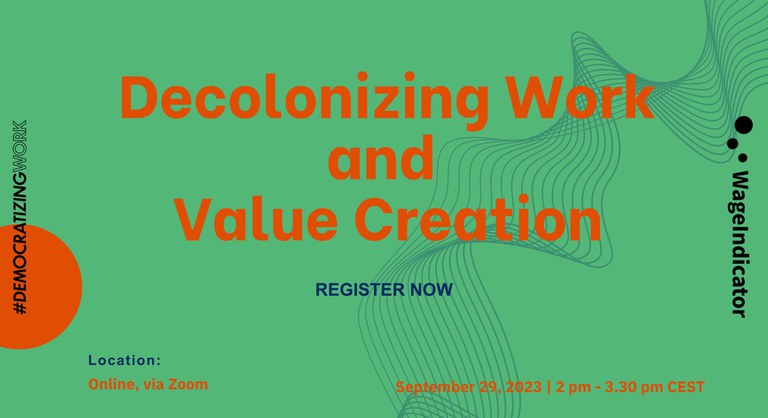Work conditions are changing fast, and many of these changes are globally interconnected. Digitization drives new work patterns and business practices, while the need to decarbonize changes the nature of many jobs. This series brings together progressive academics and practitioners from around the world to discuss these issues - with each other, but also with all participants. Together, we can work it out.
Interested to learn more about #DemocratizingWork? Check out their website.
DECOLONIALIZING WORK AND VALUE CREATION
Friday September 29, 2023 | 2 PM CEST
Western notions of work and value creation are based on theories and imaginaries that have been deeply influenced by colonial practices that exploited natural resources and human labor - many of which continue to this day. How can work and value creation be reconceptionalized in ways that avoid these implicit assumptions and allow for the flourishing of workers and the environment alike? How can colonial work practices be made visible and overcome? And what does this mean for imagining the future of work in former colonies but also beyond?
Working less, living more?
Friday December 1, 2023 | 2 PM CET
Work time reduction has become a new policy issue and matter of negotiation between employees and employers. Recent experiments with shorter work weeks have garnered a lot of media attention. One motivation is the need to honor people’s care work and other forms of unpaid work, with some scholars calling for everyone to get engaged in care work. How should one think about such ideas from the perspective not only of employees’ autonomy, but also of society as a whole? Are they feasible for all societies, or are they a luxury that only richer societies can allow themselves? And how do they hang together with suggestions for making both our work and our societies more democratic?
Register now to attend Working Less, Living More?
Enabling workers to govern their work
Friday January 26, 2024 | 2 PM CET
While some proposals for democratizing work focus on representative forms of democracy, e.g. board members elected by employees, others focus on the direct involvement of workers on the ground. Skeptics often hold, however, that this is only feasible - if at all - for highly skilled employees. But is this really so, or is it a prejudice based on misguided ideas about meritocracy? What does it take to enable workers to truly participate in the governance of their own work? What frictions must be expected, and how can they be overcome? And what role can other actors (activists, unionists, researchers, etc.) play in enabling the governance of work by workers themselves?
Union politics and unions’ mission
Friday March 22, 2024 | 2 PM CET
In the US, unionization happens (if it happens at all) mostly at the company level; whereas in South Africa and many European countries it happens at the sectoral level. But how should one understand union’s mission - is it only about the interests of workers, or does it include broader societal issues, for example gender justice and environmental justice? How can union activists position themselves in different political contexts, and how can they win majorities?
Circular economy, circular work?
Friday June 7, 2024 | 2 PM CEST
The idea of a “circular economy” aims at reducing the use of natural resources by considering products from “cradle to cradle”, making the recycling and reuse of materials a basic principle of economic life. It is connected to the turn away from economic growth, traditionally understood, as aim of the economy, as discussed in the “degrowth” or “postgrowth” literature. What do these new models mean for work? Can work also be “circular”? What can one learn from non-traditional economic models, such as alternative forms of agriculture, about work that has left the growth mindset? Can work in a degrowth world still allow for personal growth and development, and how could a transition to such forms of work take place in different economic, cultural, and political contexts?

